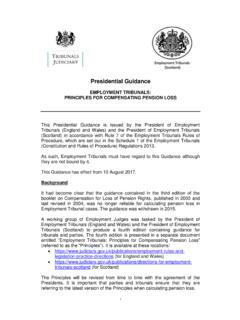Transcription of LegalUK The strength of English law and the UK jurisdiction
1 LegalUKThe strength of English law and theUK jurisdictionIn conjunction withSummary1. The UK has an independent judiciary and compliance with the rule of law. These factors inspire business confidence and underpin international trade and investment. 2. Substantive English common law is clear, fair and predictable, and based on precedent. 3. English common law, together with the UK legal system, is, and has always been, flexible. It adapts to meet the challenges of an ever-changing commercial world. 4. UK court and arbitral procedures are practical and innovative, delivering speedy and efficient resolution of business and financial disputes. 5. Litigation and arbitration in the UK is cost-effective. 6. The UK will remain a global Arbitration and Alternative Dispute Resolution (ADR) centre post-Brexit. Brexit will have no impact on the New York Convention on Arbitral Awards. 7. The mutual recognition and enforcement of UK judgments abroad will largely continue as before, whether under long-standing bilateral treaties or under common law principles of comity.
2 8. UK exclusive jurisdiction and choice of English law clauses will continue to be given effect after Brexit. 9. London and major cities across the UK will continue to provide unrivalled access to high quality legal services. 10. The UK will remain one of the leading financial, insurance and commercial centres in the world. LegalUK : The strength of English Law and the UK jurisdiction1. The UK has an independent judiciary and compliance with the rule of law. These factors inspire business confidence and underpin international trade and investment. The UK has a strong and incorruptible judiciary, which is drawn from the highly experienced ranks of the senior legal profession. It is structurally and practically independent from both the executive and the legislature. This ensures fair and predictable dispute resolution. International parties litigating in the UK can be confident that their disputes will be decided only on their intrinsic merits, without regard to nationality, politics, religion or race.
3 Brexit can have no impact on this cornerstone of our legal system integrity, independence and expertise of the senior judiciary. Arbitrators are also highly qualified and independent (see 6. below). 2. Substantive English common law is clear, fair and predictable, and based on precedent. The English common law respects the bargain struck by the parties. When planning a transaction or having to deal with the situation that has gone wrong, businesses know where they stand under English law and can predict outcomes with a high degree of certainty. The English common law respects party autonomy as to the terms of the contract, and will not imply, or introduce, terms into the parties bargains unless stringent conditions have been met. Brexit will not change the substantive content and application of English contract and commercial law as it was never part of EU law. 3. English common law, together with the UK legal system, is, and has always been, flexible.
4 It adapts to meet the challenges of an ever-changing commercial world. The English common law is the market leader in addressing the problems of globalised financial markets. Currently the common law is leading the way in Fintech, Digital Ledger Technology and Artificial Intelligence. Brexit changes none of this. 4. UK court and arbitral procedures are practical and innovative, delivering speedy and efficient resolution of business and financial disputes. The UK courts have taken the lead by introducing special procedures for the resolution of high profile financial market disputes in the Financial List of the newly established Business and Property Courts. By adopting a UK jurisdiction or arbitration clause, businesses can be confident that their dispute will be resolved speedily and efficiently. In arbitrations, the supervisory court of the arbitration will be a business-friendly court run by a judge with extensive and relevant commercial experience.
5 5. Litigation and arbitration in the UK is cost-effective. The overall cost of UK international dispute resolution compares favourably with costs elsewhere and offers value for money. All fees can be competitively negotiated. Parties have autonomy in the conduct of business litigation. Significant cost/benefit advantages can be achieved by adapting court procedures to meet the particular requirements of the case; for example, by reducing the scope of disclosure. In addition, experienced judges are proactive in preventing unnecessary cost escalation by appropriate case management directions. 6. The UK will remain a global Arbitration and Alternative Dispute Resolution (ADR) centre post-Brexit. Brexit will have no impact on the New York Convention on Arbitral Awards. The UK is a party to the New York Convention on the Recognition and Enforcement of Foreign Arbitral Awards 1958. Its subscription to the Convention will be unaffected by Brexit and the Convention will continue to apply so as to allow UK arbitral awards to be recognised and enforced in the 157 states (including the EU Member States) that are parties to it.
6 London will remain one of the world s most commonly selected seats in institutional arbitration and ad hoc arbitration. This is due to a highly qualified legal community, the presence of the London Court of International Arbitration and other leading arbitral bodies, a clear legislative framework and a pro-arbitration judiciary. 7. The mutual recognition and enforcement of UK judgments abroad will largely continue as before, whether under long-standing bilateral treaties or under common law principles of comity. Nothing will change at all if the UK and the EU have a relationship based on the Brussels Recast Regulation after Brexit. But, whatever the Brexit outcome, in non-EU states, judgments will continue to be mutually recognised and enforced under previous bilateral treaty arrangements, protocols or as a matter of comity. 8. UK exclusive jurisdiction and choice of English law clauses will continue to be given effect after Brexit.
7 The EU is a signatory to The Hague Convention on Choice of Court Agreements. The UK can become a signatory in its own right post-Brexit. The Hague Convention requires other courts to dismiss proceedings to which a choice of court agreement applies, save in narrowly defined circumstances. Parties who agree to resolve their disputes before the UK courts can rest assured that the resulting judgment will be given effect throughout the EU, as previously. Moreover, the UK can unilaterally legislate to include Rome I and Rome II on applicable law as part of English London and major cities across the UK will continue to provide unrivalled access to high quality legal services. London is, and will remain, home to many of the world s leading international law firms. There are few restrictions to access the UK for law firms headquartered abroad. More than 200 overseas law firms from some 40 jurisdictions practise in London, including more than 100 US law firms.
8 High quality solicitors, barristers, arbitrators, mediators and legal practitioners are available throughout the UK: of the 370,000 people employed in private practice, two-thirds are based outside The UK will remain one of the leading financial, insurance and commercial centres in the world. This is underpinned by a strong regulatory framework and expertise in regulatory law. In addition, the English language is and will remain the language of business, irrespective of the consequences of Brexit. The UK s specialist Business and Property Courts have been developed to meet the needs of international businesses operating across industrial sectors. These include the Financial List; the Commercial Court (the world s leading forum for the resolution of international trade, shipping and insurance disputes, where two-thirds of claims involve at least one overseas party); the Insolvency and Companies List (which has handled some of the biggest international reconstructions and insolvencies of recent years); the Intellectual Property List (which will continue as one of the most popular Patent, Trademarks and IP forums in Europe); the Business List of the Chancery Division; and, the Technology and Construction Court (dealing with disputes arising out of construction and engineering projects both in the UK and internationally, together with IT and procurement disputes).
9 The Business and Property Courts are located in London, Cardiff and other major cities across the UK.













